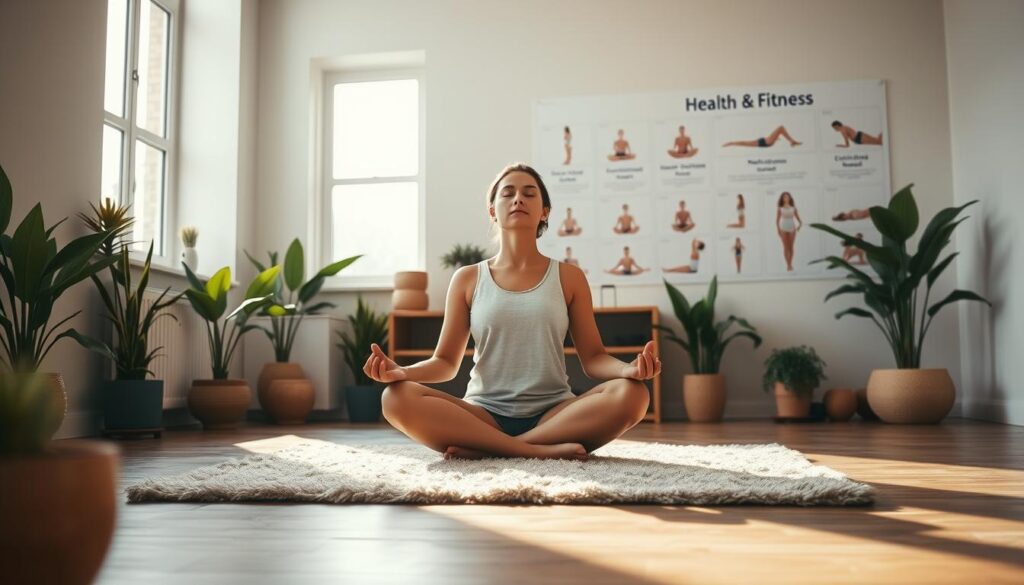A Harvard study shows something cool. They found that meditation can actually make parts of your brain grow. This helps with things like memory, feeling good about yourself, understanding others, and dealing with stress. In a world full of distractions and a lot of stress, meditation is a strong tool. It can make your mind clearer and your emotions better.
Meditation has many perks. It can make you less anxious and help you concentrate better. By learning how to harness the benefits of meditation for mental clarity, you find peace and balance. This affects every part of your life.
Starting with mental health meditation practices isn’t just about being quiet. It’s about making a routine. This routine helps you handle stress and focus better through meditation. This leads to a life that is more balanced and focused. We’ll now look into how important meditation is. We’ll also see the many benefits and ways to do it.
Key Takeaways
- A Harvard study shows that meditation increases brain gray matter density.
- Mindfulness meditation can significantly enhance memory and empathy.
- Meditation helps in managing stress and enhancing emotional well-being.
- Routine meditation leads to improved mental clarity and focus.
- Embracing meditation can create a balanced and grounded life.
Understanding Meditation and Its Impact on Mental Clarity
Meditation is an old practice. It helps your mind focus and get rid of distractions. People who meditate handle stress better and feel more at peace.
What is Meditation?
Meditation is a way to focus and be fully present. It helps people be more aware and focused. It’s not just for relaxation, but for a healthier mind and emotions too.
The Science Behind Meditation
Research shows meditation is good for the brain. It can make parts of the brain better at memory and emotions. It also helps reduce wandering thoughts.
Types of Meditation Techniques
There are many kinds of meditation, each with its own benefits:
- Mindfulness Meditation: Focuses on being intensely aware of what you’re sensing and feeling in the moment, without interpretation or judgment.
- Transcendental Meditation: Involves silently repeating a mantra to settle the mind into a state of restful alertness.
- Guided Visualization: Uses mental images and scenarios to promote relaxation and mental clarity.
These techniques help the mind focus and be at peace.
The Psychological Benefits of Meditation
Meditation helps a lot with one’s mind and feelings. People use meditation for stress relief and see big changes. They feel better and think clearer. Let’s talk about how it lowers anxiety and stress, and makes our emotions stronger.
Reducing Anxiety and Stress
Meditation can really help with anxiety and stress. It keeps your nervous system calm. If you meditate often, your body makes fewer stress hormones. This makes mental health meditation super helpful. Mindfulness makes you focus and stay calm, even when things are tough.
Enhancing Emotional Well-Being
Meditation also makes you emotionally stronger. Mindfulness for mental clarity helps you understand your feelings better. You become more tough and positive. Regular meditation leads to stable emotions, a happier mood, and a more cheerful view on life.
How Meditation Affects Brain Functionality
Meditation helps us think clearer and improves how our brain works. It is good for our mental health and how we perform tasks.
Neuroplasticity and Meditation
Meditation supports neuroplasticity. This means our brain can form new connections all our life. It helps us adapt to new things, learn, and heal from injuries.
When we practice meditation, we help our brain become more flexible. It activates parts of the brain important for memory, learning, and managing feelings.
Meditation’s Role in Memory Enhancement
Meditating regularly makes our memory and brain work better. Mindfulness and other meditative practices help us remember and understand more.
Meditation helps us focus and relax. This lowers stress and worry, which can block good memory. Meditation keeps our mind sharp and quick.
Meditation connects closely with how our brain works. It is a strong way to improve our mental and emotional health. Adding meditation to our daily life boosts brain flexibility. It makes our mind stronger, more focused, and full of life.
Tips for Starting Your Meditation Practice
Starting meditation is both fun and good for you. You need the right place and a regular routine. These tips will help you add meditation to your everyday life. It makes your mind clearer.
Finding the Right Space
It’s important to find a good place for meditation. Pick a quiet spot where no one will bother you. This place should feel comfy, be tidy, and just for meditating. Add things like pillows, candles, or plants to make it welcoming. Making your meditation spot yours helps you concentrate better and feel peaceful.

Setting a Routine
Sticking to a routine helps a lot with meditation. It makes meditating a normal part of your day. Begin with short times and then do it longer as it gets easier. Morning or evening sessions are great for feeling calm or relaxing. Be patient and let your meditation get better over time.
Meditative Techniques for Mental Clarity
To get a clear mind, try some meditation methods. Mindfulness and transcendental meditation are quite helpful. They make your mind and thinking better.
Mindfulness Meditation
Mindfulness meditation helps a lot with mental clarity. It teaches us to live in the now and not judge. It started with the Buddhists but now many people love it.
Doing mindfulness often helps focus, lowers stress, and helps control emotions. It includes paying a lot of attention to breathing, how your body feels, and what’s around you. This helps you be more aware and calm.
Transcendental Meditation
Transcendental meditation, or TM, is great for a clear mind too. Maharishi Mahesh Yogi made it popular. You quietly repeat a special mantra for 15-20 minutes, twice a day. It helps you relax deeply.
Studies show TM is good for your brain, helps with anxiety, and makes you smarter. Doing it every day brings peace and clear thinking.
Both mindfulness and TM are very good for a clear mind. They lower stress and make you feel better. Adding these to your day can make a big positive change in your mind.
Overcoming Common Obstacles in Meditation
Meditation comes with challenges, like distractions and being regular. Facing these can make meditation better for mental health.
Addressing Distractions
Distractions can come from noise, thoughts, or discomfort. To meditate better, try soft lights, music, or nature sounds. Mindfulness can bring your focus back using your breath or mantra.
How to Stay Consistent
Being regular with meditation helps a lot. A routine, like meditating at the same time every day, works well. Using a journal or apps like Headspace or Calm helps too.
Using these tips can make meditation more helpful. It leads to better mental health and happiness.
Incorporating Meditation into Your Daily Life
Meditation can make your life and work better. You can try it at different times for different benefits. It helps you feel calm and think clearly.
Morning vs. Evening Meditation
When you meditate matters. Morning meditation makes your day calm and clear. Evening meditation helps you relax and sleep well. Morning time wakes you up inside, while evening helps you calm down.
| Time of Day | Benefits |
|---|---|
| Morning |
|
| Evening |
|
Meditation at Work
Work can stress you out. Meditation helps you stay calm and focused. Try quick mindfulness or breathing exercises at work. Having a quiet place for it helps a lot.
Meditating at different times helps your mind and heart. Morning or evening, or even at work, it changes you for the better.
Advanced Practices for Deepening Meditation
To go deeper in meditation, learn advanced techniques. These can really change your meditation journey.
Guided Visualization
In guided visualization, someone leads you through calming images in your mind. These images help relax your body and mind. You might feel like you’re in a peaceful place. It makes meditating better and sparks creativity and clear thinking.

Chanting and Mantras
Chanting and using mantras is also very powerful. Repeating special words or sounds helps focus your thoughts. It can move you past daily distractions. Chanting brings a soothing rhythm. It helps you meditate deeper. Adding well-known mantras like “Om” can make focusing easier.
Real-Life Examples of Meditation’s Benefits
Meditation greatly improves our minds and bodies. This is shown through many personal stories and studies. Let’s look at some impressive meditation testimonials. These show the real-life benefits of meditation.
Testimonials from Practitioners
Many people have told how meditation changed their lives. For example, Oprah Winfrey says meditating twice a day made her more productive and happy. Basketball star LeBron James uses meditation to stay calm and focused during big games. These meditation testimonials show how meditation can deeply change our lives.
Studies Supporting Meditation’s Efficacy
There are lots of studies that show meditation is good for us. One study in Psychiatry Research showed that meditation can decrease stress and anxiety in just eight weeks. Another study from Harvard Medical School found that meditation makes our brains better at remembering and learning. These studies prove that meditation has many real-life benefits.
Resources for Further Exploration
If you want to learn more about meditation, there are many resources available. You can find books, apps, and online places to help you, whether you’re a beginner or already know a lot. Look around to find what helps you the most in your meditation journey.
Recommended Books and Apps
Books can give you deep insights and clear steps on how to meditate. For those starting or already deep into meditation, “The Miracle of Mindfulness” by Thich Nhat Hanh and “10% Happier” by Dan Harris are great. Also, apps like Calm, Headspace, and Insight Timer make meditation easy to do anytime. They have guided meditations, timers, and ways to track your progress.
Online Communities and Forums
Joining an online meditation group can be very supportive and uplifting. On sites and forums like Reddit’s r/meditation and Insight Timer’s community areas, you can talk about your experiences, get advice, and meet others who like meditation too. These places are great for sharing tips and feeling part of a bigger group of people who meditate.